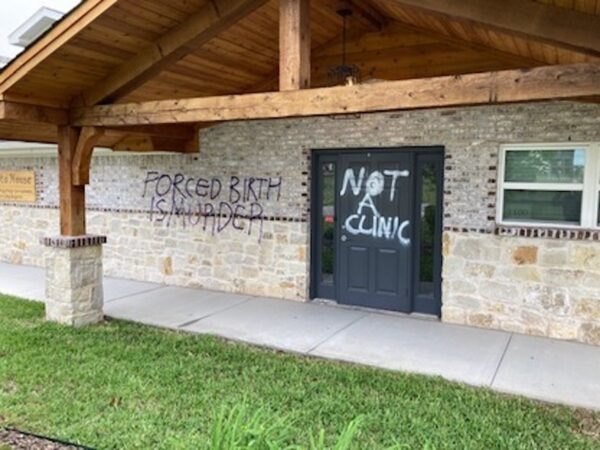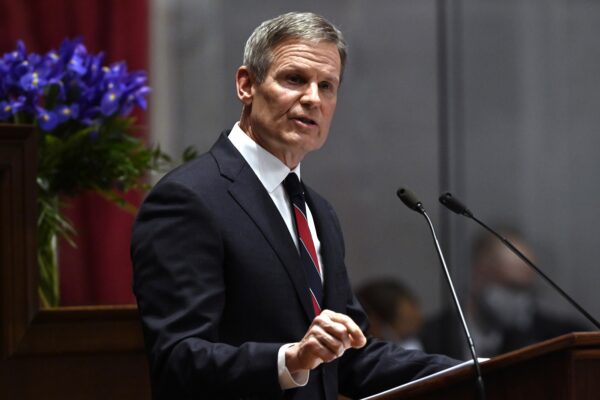


“Civility is not a weakness, by the way, it is a strength,” Tennessee Gov. Bill Lee (R) said after at least one audience member interrupted him at the State of the State address Monday at the state capitol in Nashville.
The governor, going off script amid the heckling, was in the process of announcing a major injection of grant money into crisis pregnancy centers. This follows the state’s enacting of one of the nation’s strictest abortion laws following the overturning of Roe v. Wade by the U.S. Supreme Court.
Lee said the $100 million grant program would be directed toward nonprofit centers with a focus on serving “mothers, fathers, and families during a crisis pregnancy.”
He added that 2022’s budget funded ultrasound machines for crisis pregnancy clinics across Tennessee. There are currently 60 such centers across the state, according to The Crisis Pregnancy Center Map.
The latest report (pdf) on pregnancy centers in Tennessee from the Charlotte Lozier Institute (CLI) reveals the state clinics provided more than $5.2 million in services and materials to over 65,000 men, women, children, and families.
The institute studies the impact of such centers around the nation. CLI says its research reveals that a majority of Americans consider pregnancy centers a valuable community resource.
“Pregnancy centers exist to serve and support mothers in the courageous decision to give their children life, even under the most difficult circumstances,” said Chuck Donovan, president of the Charlotte Lozier Institute, the research arm of Susan B. Anthony List. “All Americans benefit from these resources in communities everywhere across our national landscape.”
Democratic lawmakers in the state have been vocal in opposition to the state’s strict abortion laws and the governor’s latest proposal.
Lee’s comments sparked ire from Democratic lawmakers, who argued the governor was ignoring the concerns of women who no longer have access to abortion services in Tennessee.
“It’s embarrassing that Gov. Bill Lee made a smart aleck comment during the State of the State directed at women upset that they no longer are considered equal in this state,” state Democrat Rep. Gloria Johnson posted on Twitter. “Dissent is not incivility.”
Critics of the crisis pregnancy centers have labeled them as “facilities that represent themselves as legitimate reproductive health care clinics providing care for pregnant people but actually aim to dissuade people from accessing certain types of reproductive health care, including abortion care and even contraceptive options.”
Lee said the Roe overturn was a “significant shift in the country” when it comes to “protecting the lives of the unborn.”
He added that Tennesseans have an “opportunity and a moral obligation” to support strong Tennessee families.
The Governor’s Office of Faith-Based Initiatives can engage with nonprofits and community organizations. Lee said it’s time to equip those nonprofits with the resources needed to play a bigger role in serving children and families.
“Pro-life is much more than defending the lives of the unborn,” he said. “This is not a matter of politics. This is about human dignity. We can have a healthy debate about the policy specifics, but we can also agree that America is rooted in a commitment to human dignity.”
The governor proposed other social spending measures for new parents through the state’s Medicaid program, TennCare, and expanding paid family leave for state employees.
Tennessee received a waiver for its Medicaid TennCare program, the only such waiver in the nation, which allowed the state more flexibility in spending.
Lee said the waiver, which was approved in the final days of the Trump administration, allows the state to receive a block grant and set an amount of funding instead of the federal government paying two-thirds of the costs of TennCare. This also allows more flexibility in spending.
“Our waiver actually rewards a state for efficient, responsible management of taxpayer resources by awarding additional federal funds—known as shared savings—to serve the most vulnerable,” he said. “I’ve said all along, we would only move forward with this waiver if it was a good deal for Tennesseans. Tonight, I can share that we have claimed the first returns from this program, and not only did we get a good deal, we got a great deal.”
Lee said in the first year of the program, in 2022, the state received more than $300 million in shared savings from the prior system “at no additional burden to Tennessee taxpayers.”
Among new programs funded by those savings, in terms of TennCare, Lee wants to strengthen postpartum coverage, provide services to over 5,000 more mothers, close the coverage gap for parents, and reach an additional 10,000 children.
Lee said changes would expand the program to a total of 25,000 more women, children, and parents in need.
With savings in years to come, Lee said the state has the opportunity to “expand more services, reach more families in need, and improve rural health care access across our state.”
Additional funding will also go to the Department of Children’s Services, which has recently had leadership changes following poor report cards from a state audit showing that children were often left sleeping in state office buildings while foster families were found.
“Commonsense paid parental leave” is another proposal the governor touted Monday night, stating he wanted to expand the program for state employees.
Lee said the proposal is not wide-reaching in that it is not a mandate on businesses, stating business owners should make the choices in the best interest of their employees.
“One way we can support and strengthen families is by making it possible for parents to be there, worry-free, for every second of those first months of life,” he said. “If we can strengthen the bond between parents and children from the very first moments, we will have truly done something important.”
He also proposed asking the federal government to pay for the cost of diapers for Medicaid recipients in the state for the first two years of the child’s life.
“If approved, Tennessee will be the first Medicaid program in the nation to implement this kind of support. That’s pro-life. That’s pro-family,” Lee said.


